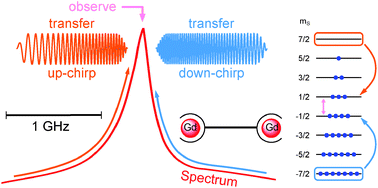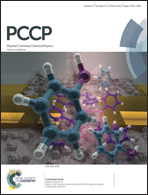Sensitivity enhancement by population transfer in Gd(iii) spin labels†
Abstract
In order to enhance echo signals observed with selective pulses, equilibrium populations of the energy levels of S = 7/2 Gd(III) spin labels are rearranged with frequency-swept passage pulses. To transfer population from as many energy levels as possible, the 2 μs long passage pulses range over more than 1 GHz. Application of this technique at Q-band frequencies to three different Gd(III) complexes and spin dynamics simulations reveal large signal enhancements beyond 100% for Gd(III) complexes with zero-field splitting parameters below 1 GHz. For complexes with larger splittings, experimental enhancements are on the order of 90%. Moreover, population transfer is combined with distance measurements on a model system with a pair of Gd(III) ions. As a result, a signal enhancement of 85% is achieved without inducing changes in the obtained distance information. Besides this enhancement by population transfer, a dipolar modulation depth of 9% is demonstrated, which results in a total enhancement of 3.3 with respect to data obtained with monochromatic rectangular pulses. The limitations of the population transfer technique are discussed. In particular, the extraordinary broad pulse bandwidths caused heating effects and pulse distortions, which constrain the pulse length and thus the achievable signal enhancement.


 Please wait while we load your content...
Please wait while we load your content...